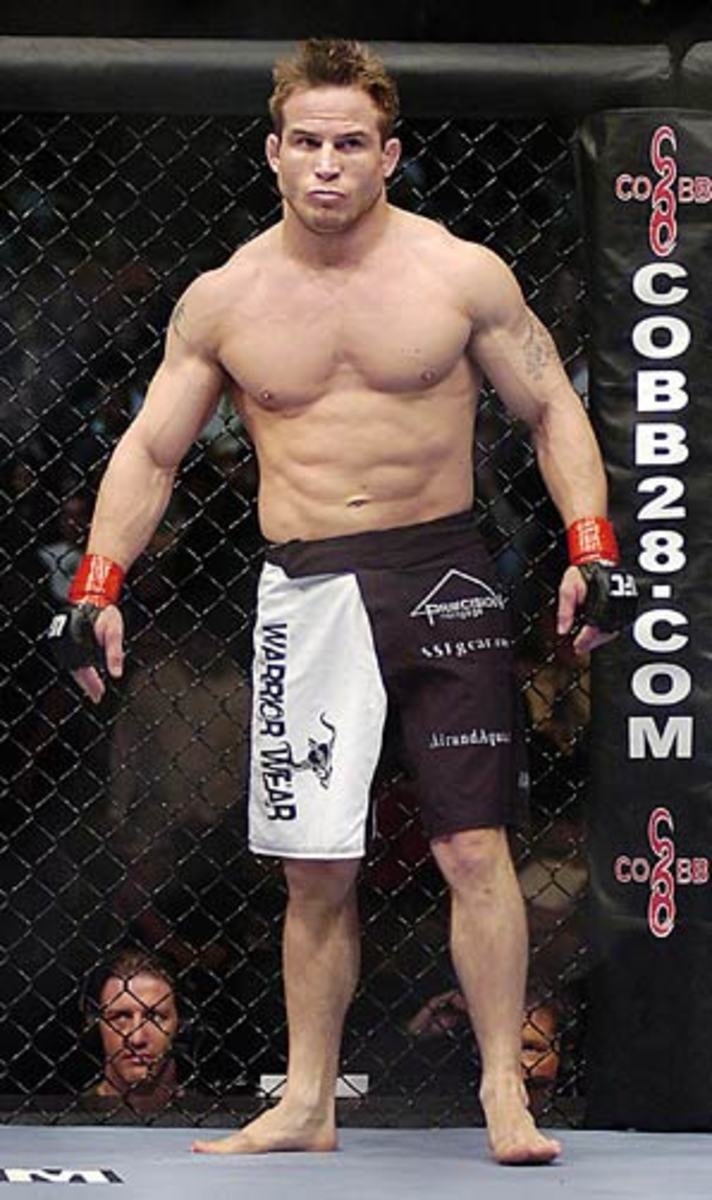His past still hovers, but Sherk has a chance to define his future
It's a story we've come to know very well: pro athlete tests positive for steroids, fans respond with tired disappointment. Pro athlete professes innocence, fans grow even more tired. Pro athlete slinks back into the fold, fans forgive, but never quite forget.
It gets a little more depressing every time we see it played out, but only because it's so predictable. We used to use terms like "disgraced" to refer to these fallen heroes. Now, that rhetoric seems too dramatic for something so increasingly common. We just say "tarnished." Or "caught." We don't know who will be next, but we know there will surely be a next.
It's this impenetrable skepticism that makes Sean Sherk's situation so daunting. The former Ultimate Fighting Championship lightweight title-holder tested positive for steroids after defeating Hermes Franca last summer. Sherk immediately cried foul.
He filed an appeal with the California State Athletic Commission.
He hired lawyers and built a case against Quest Diagnostics, the laboratory responsible for testing the samples.
He took, and passed, three polygraph tests.
He tested his over-the-counter supplements and presented evidence of contamination in one of them.
But none seemed to make a difference. Not to the CSAC, the media or the fans. The athletic commission cut Sherk's suspension in half, but upheld his $2,500 fine -- a kind of tip of the hat to reasonable doubt, but one that didn't erase the damage to his career and reputation. He lost his title and saw it awarded to rival B.J. Penn, who has repeatedly condemned Sherk for the positive test. To most, Sherk was branded a cheater -- a label that still follows him everywhere, threatening to diminish his accomplishments.
"I've done everything I can do to clear my name," Sherk said. "It's up to each individual to look at the facts and decide for themselves whether they believe me or not. The problem is that a lot of people don't bother to look at the facts first. They just hear 'positive test,' and they look at me and what I've done and think, 'Oh, he's got to be on something.' I'm not. People have to decide that for themselves, but the people who know me and the people who look at the facts will see for themselves that I'm telling the truth."
It seems like nothing he can say or do will ever be enough. No polygraph test or evidence of contamination. As sports fans, we're past the point of even considering his innocence. If an accusation was enough to torpedo someone like Roger Clemens, a positive test seems like a stand-alone guilty verdict for Sherk. It just fits the usual story line.
However, the typical narrative isn't always the right narrative.
Even the most cynical among us has to accept that while there are, undoubtedly, legions of banned substance-users who are never caught, there will inevitably be innocent athletes condemned by false positives. When it happens, though, good luck pleading the case. The well was poisoned around the time the Bay Area Laboratory Co-Operative entered the scene.
This is what Sherk is finding out as he prepares to face the highly touted Penn at UFC 84 next weekend in an attempt to reclaim the lightweight title.
"It's out of my hands, really," Sherk said. "I still feel like that belt is mine. I don't think it should have ever been taken from me in the first place. I'm looking forward to the chance to get it back and I think that this is the fight where, afterwards, you'll finally be able to say who's the real lightweight champion."
The question now isn't just whether or not you believe Sherk, who the CSAC and UFC have both labeled a guilty man who has served his time, but what you make of his career before and after the positive test.
Sherk is 32-2-1 in his MMA career. He's only been stopped once -- by current welterweight champ Georges St. Pierre in a bout that precipitated Sherk's drop to the155-pound division. Do we throw all that out the window based on the suspicion that he might have used steroids before without ever being caught? If he beats Penn and reclaims the title while testing clean, does that put the controversy to rest?
There's no easy answer. Sherk may be a cheater. He may be an innocent man wrongly accused. Only he knows for sure. While he's had to endure a torrent of criticism the past 10 months, he'll get the chance that every fighter does when he or she steps into the arena: a shot at victory based on merit and ability alone. No drugs. No rulings from the athletic commission. Nothing but two fighters in the cage together.
What Sherk does with his chance may define his career up to this point and beyond. Considering the level of competition he's facing in Penn, it would be hard to imagine a better metric by which to judge a man.






